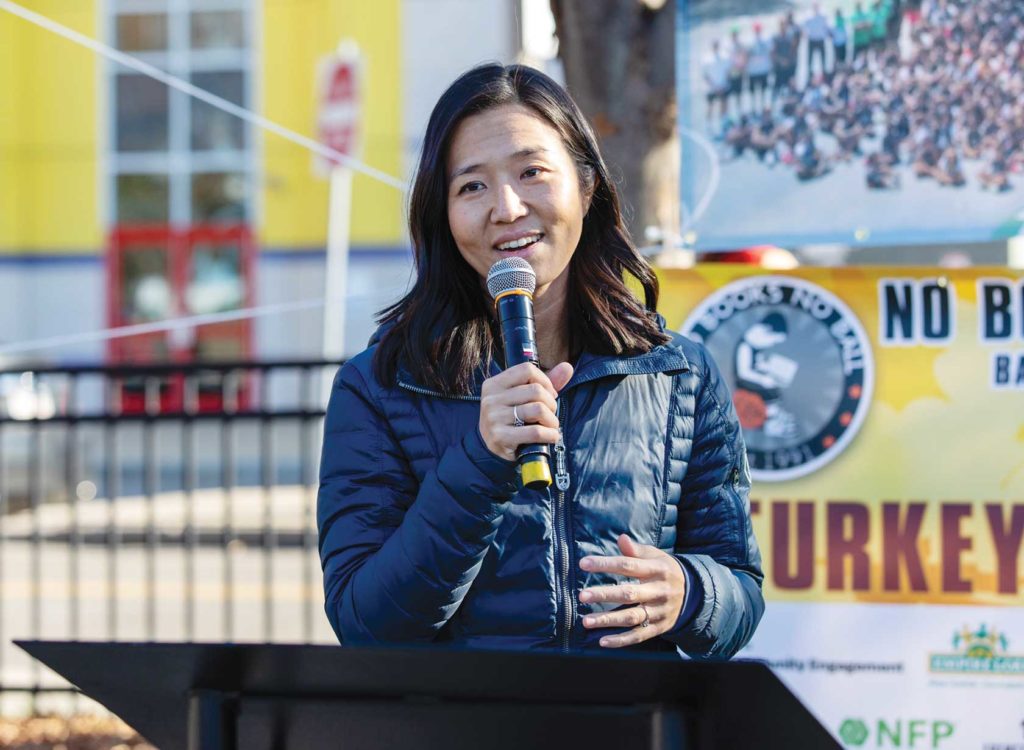
With rising incidents of juvenile crime, including a spate of youth-involved shootings and firearms arrests, Boston Mayor Michelle Wu has announced the creation of a new city task force aimed at preventing youth violence and addressing the trauma of victimized individuals, families and communities.
The new Youth Safety Task Force, composed of representatives from across city departments, will work closely with Boston Public Schools, Wu says, to identify specific youth at risk of committing or becoming victimized by violence, and to take action to connect those young people and their families with available resources.
And in this case, that means sharing strategies and building a plan, student by student, family by family, school by school.
Wu emphasized that citywide crime rates are down overall from last year, but she acknowledged that those statistics do not hold true for crimes committed by juveniles.
“One of the troubling trends is that the number of juveniles … involved in every category of public safety incident, from shootings to robberies to assaults, has been higher,” Wu told “Radio Boston” host Tiziana Dearing.
Wu attributes at least some of the rise in youth crime to the fallout of the COVID-19 pandemic and its effect on young people.
“It’s clear that we put aside a lot of priorities during the pandemic. It was all hands on deck to save lives and keep people safe from COVID,” she said.
As a result, she said, “The supports and after-school programs that used to exist were put on pause because people couldn’t be together safely, [as well as] other infrastructure around social-emotional supports … And it’s showing in how we are experiencing the impacts. And so the safety task force is really meant to knit people back together.”
The Wu administration has yet to provide details of which individuals or city departments will be part of the task force, or with what goals and along what timeline the initiative will proceed.
Still, several community organizations that work with youth welcomed the news as a step in the right direction.
“I think it’s a good idea to have a focus on the increase in what’s happening with our young people — I think it probably needed to be done sooner,” said Monalisa Smith, founder and president of Mothers for Justice and Equality, a nonprofit organization that works directly with youth and families impacted by violence.
“We went into this pandemic with a lot of challenges around trauma and individuals who have been exposed to violence over the years … and coming out of it, I think it was bigger than we could even imagine — so I think there is no better time than now.”
Smith said youth mental health needs are paramount and that more should be done to connect young people to such services earlier.
Jenese Brownhill, director of the juvenile justice division of the Justice Resource Institute, which offers mental health and trauma programs, including inside Boston schools, said she’s hopeful the new task force will bring more accountability and consistency to the issue of youth violence and youth trauma.
“We’re really excited it’s being at least talked about [and] owned by an entity. That is important in assuring families and kids that we are taking these incidents seriously,” said Brownhill.
Key to the initiative’s success, she said, is that it is sustained.
“Many of the risk factors for this are so deep, in so many ways, that it really will take a long time to really get at it … So I hope that what comes out of this task force is something that can be implemented [beyond any one administration],” Brownhill said. “I think youth deserve that level of commitment.”






